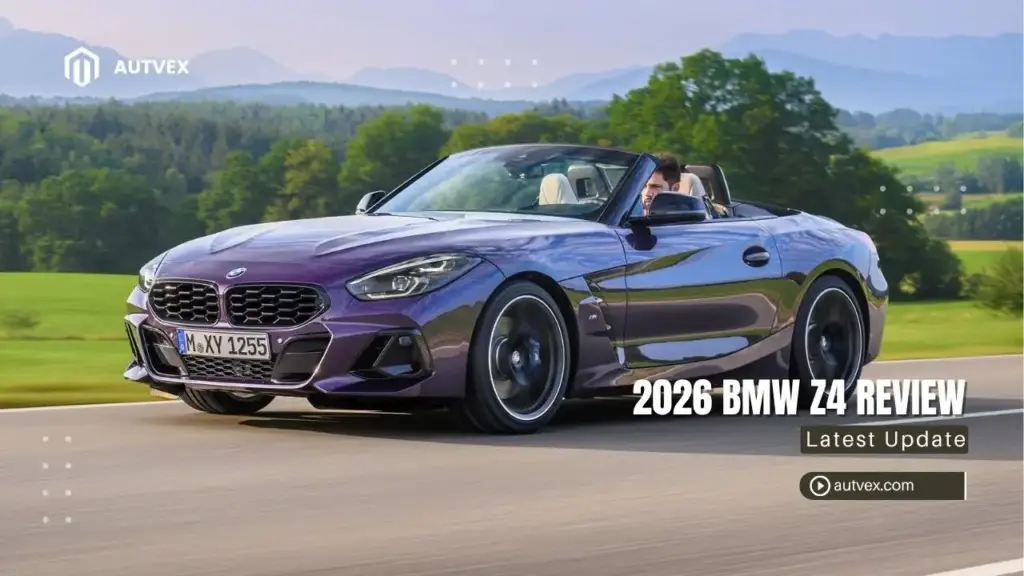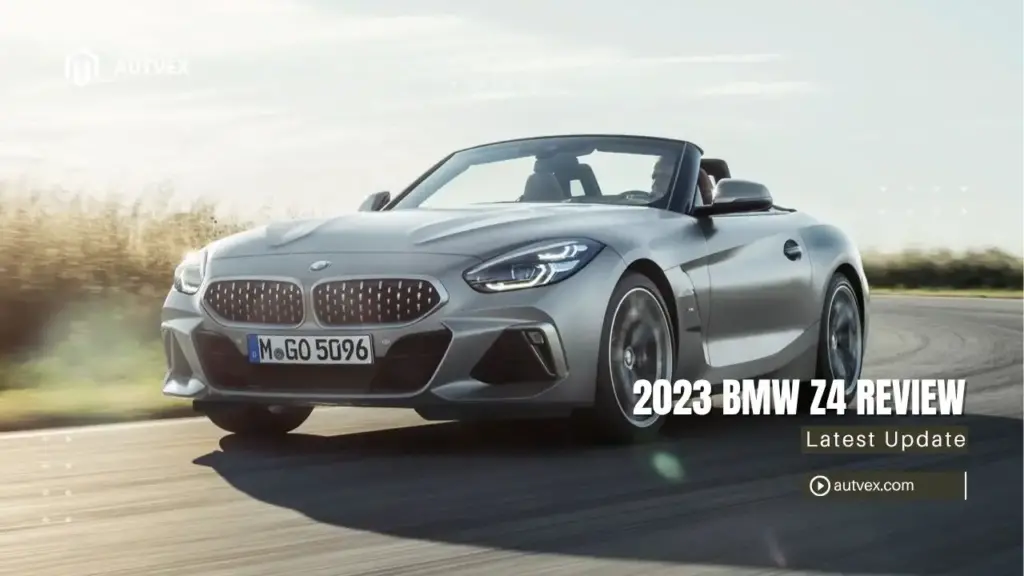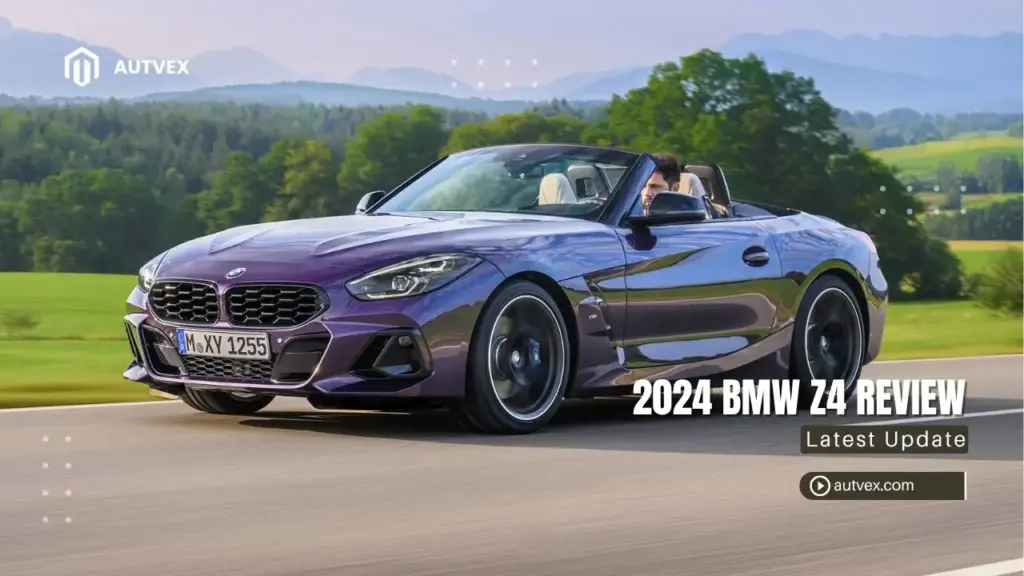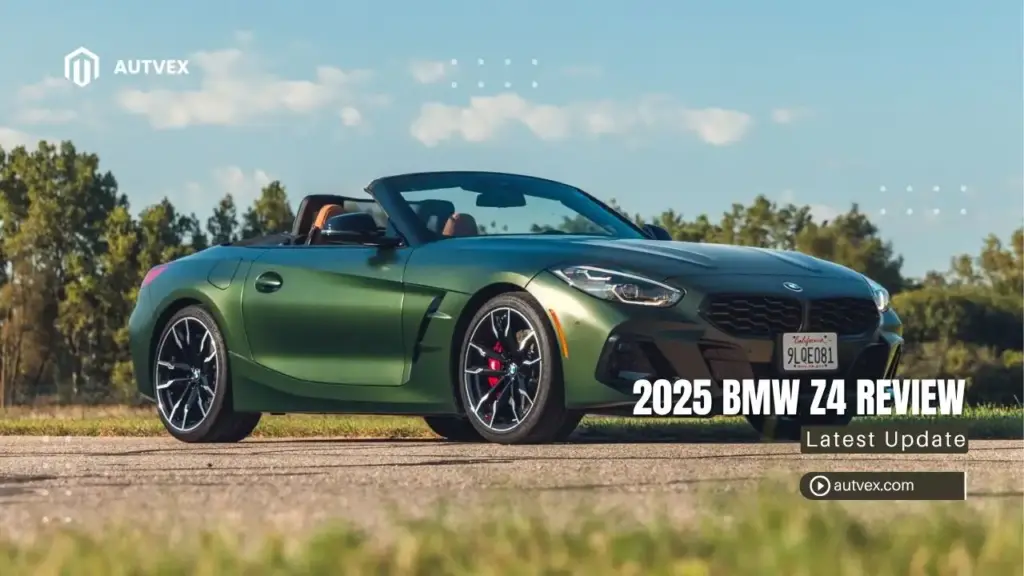You may also like:
The 2026 BMW Z4 starts at $56,100 for the sDrive30i and tops out at $78,675 for the limited Final Edition, marking the end of BMW’s beloved two-seat roadster[1]. Car and Driver rates it 8.5 out of 10, praising its “blend of athleticism and comfort” that makes it easier to live with daily than harder-core rivals like the Porsche 718 Boxster[2].
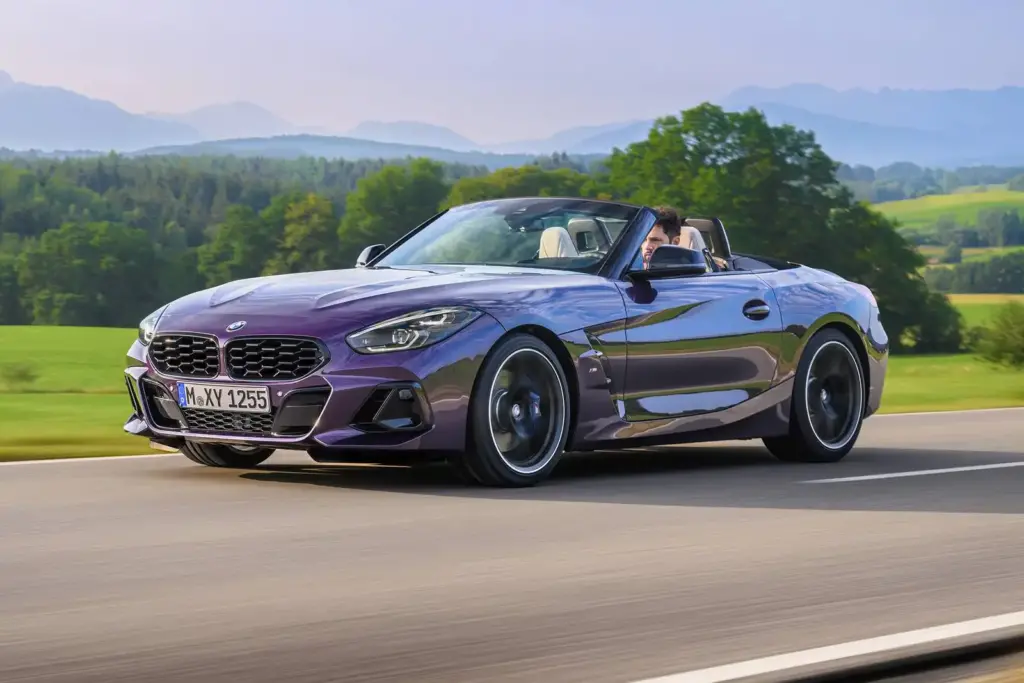
Quick Verdict
The 2026 Z4 strikes an ideal balance for buyers who want top-down driving fun without track-focused punishment. Both engines deliver lively performance—the M40i reaches 60 mph in just 3.5 seconds with the automatic and still manages 3.9 seconds with the six-speed manual[2]. The interior quality leads the segment, and the cloth top operates in seconds.
The catch? Pure handling isn’t as sharp as the Toyota GR Supra or Porsche 718 Boxster[2]. And with no fourth-generation Z4 announced, this could be your last chance to buy one new. MotorTrend confirms the Final Edition will be built in “very small numbers” between February and April 2026[3].
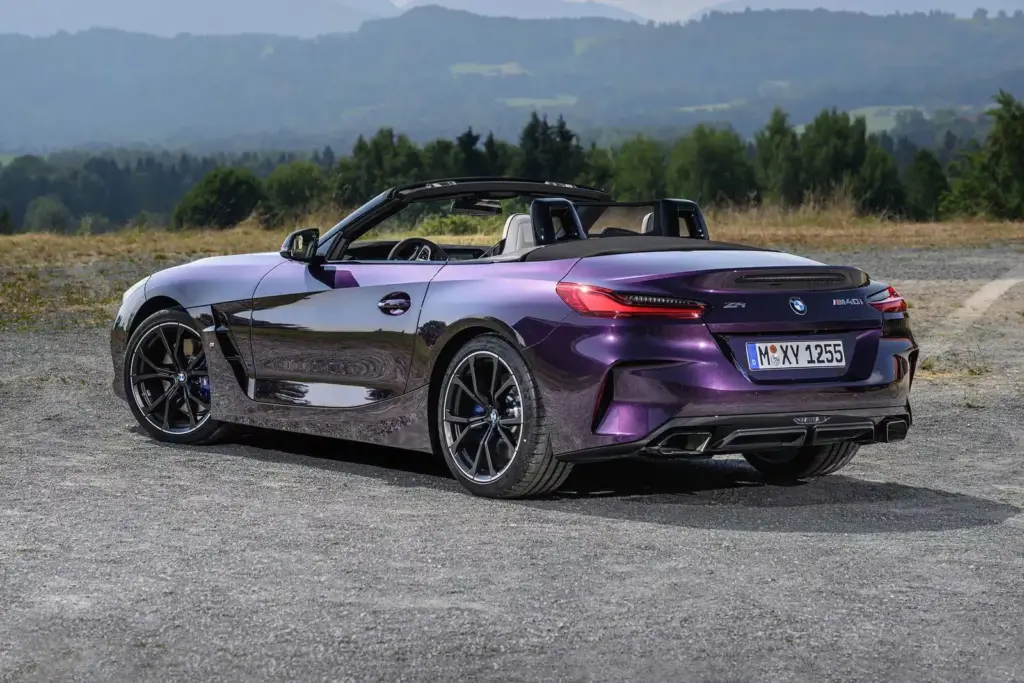
2026 BMW Z4 Pricing by Trim
| Trim | MSRP | Engine | 0-60 mph |
|---|---|---|---|
| sDrive30i | $56,100[1] | 2.0L Turbo I-4 (255 hp) | 5.1 sec[2] |
| M40i (automatic) | $68,400[1] | 3.0L Turbo I-6 (382 hp) | 3.5 sec[2] |
| M40i (manual) | $71,900+ | 3.0L Turbo I-6 (382 hp) | 3.9 sec[2] |
| Final Edition | $78,675[3] | 3.0L Turbo I-6 (382 hp) | 3.5-3.9 sec |
Kelley Blue Book lists slightly higher MSRPs of $57,275 for the sDrive30i and $69,575 for the M40i[4]. The discrepancy likely reflects timing differences in MSRP updates. Destination charges typically add around $1,175 on top of these figures.
For reference on what MSRP actually means versus transaction prices, dealers may offer incentives on non-Final Edition models as production winds down.
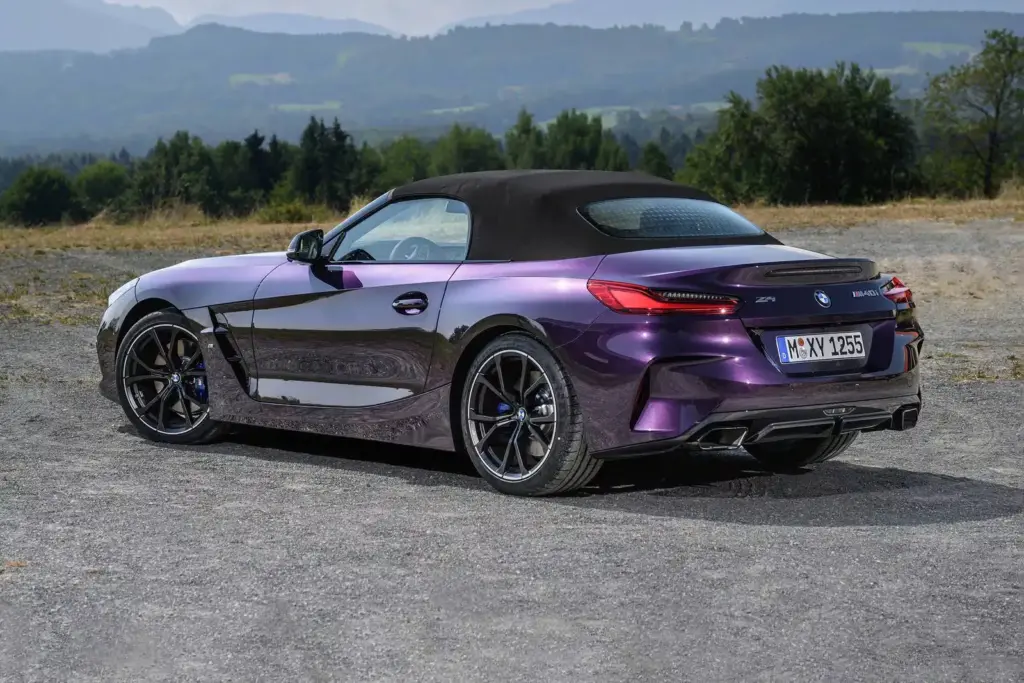
2026 BMW Z4 Final Edition
The Final Edition marks the end of BMW’s third-generation Z4 roadster—a nameplate that dates back to 2002[3]. All Final Edition models come painted in Frozen Black Metallic with the Shadowline Package standard, featuring blacked-out kidney grilles, mirror caps, and lower air intakes[3].
Interior touches include Final Edition badging on the door sills, red stitching throughout, a Harman Kardon sound system, and the Premium Package[3]. BMW’s Driving Assistance Package comes standard as well.
Buyers can choose between the eight-speed automatic or six-speed manual at the same $78,675 price—no upcharge for the stick[3]. Manual-equipped models receive the Edition Handschalter Package with unique auxiliary springs, a strengthened front anti-roll bar clamp, recalibrated variable sport steering software, and revised rear damper mapping[3].
BMW hasn’t confirmed exact production numbers. If you want one, order soon—production runs only three months.
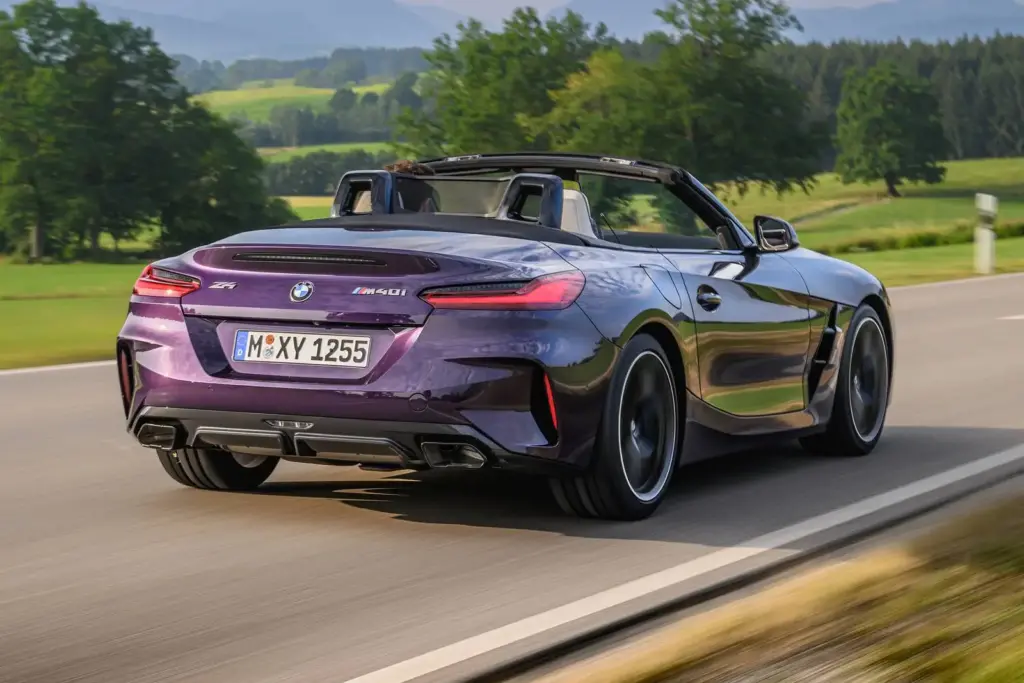
Engine and Performance
The 2026 Z4 offers two turbocharged powertrains that share almost nothing except their exceptional smoothness. Both use an eight-speed automatic as standard, with the six-speed manual exclusive to the M40i[5].
sDrive30i (2.0L Turbo I-4)
| Specification | Value |
|---|---|
| Horsepower | 255 hp @ 5,000 rpm[4] |
| Torque | 295 lb-ft @ 1,550-4,400 rpm[4] |
| 0-60 mph | 5.1 seconds (C&D tested)[2] |
| Top Speed | 155 mph (governed)[4] |
TrueCar describes the sDrive30i as “smooth and responsive, perfect for city commuting or relaxed highway cruising”[6]. The turbo four delivers plenty of torque and feels stronger than its 255-hp rating suggests[2].
M40i (3.0L Turbo I-6)
| Specification | Automatic | Manual |
|---|---|---|
| Horsepower | 382 hp @ 5,800 rpm[4] | 382 hp |
| Torque | 369 lb-ft @ 1,800 rpm[4] | 369 lb-ft |
| 0-60 mph | 3.5 sec[2] | 3.9 sec[2] |
| Quarter-Mile | 12.0 sec @ 116 mph[2] | 12.4 sec @ 113 mph[2] |
Car and Driver calls the inline-six “incredibly smooth, refined, and ferocious when provoked”[2]. The eight-speed automatic delivers “sharp responses, snappy shifts, and smooth operation”—among the best automatics available[2].
The Handschalter (German for “hand shift”) package for manual buyers adds stiffer anti-roll bars, a retuned adaptive suspension, and larger wheels with summer tires[2]. It costs $3,500 on standard M40i models but comes included on the Final Edition[3].
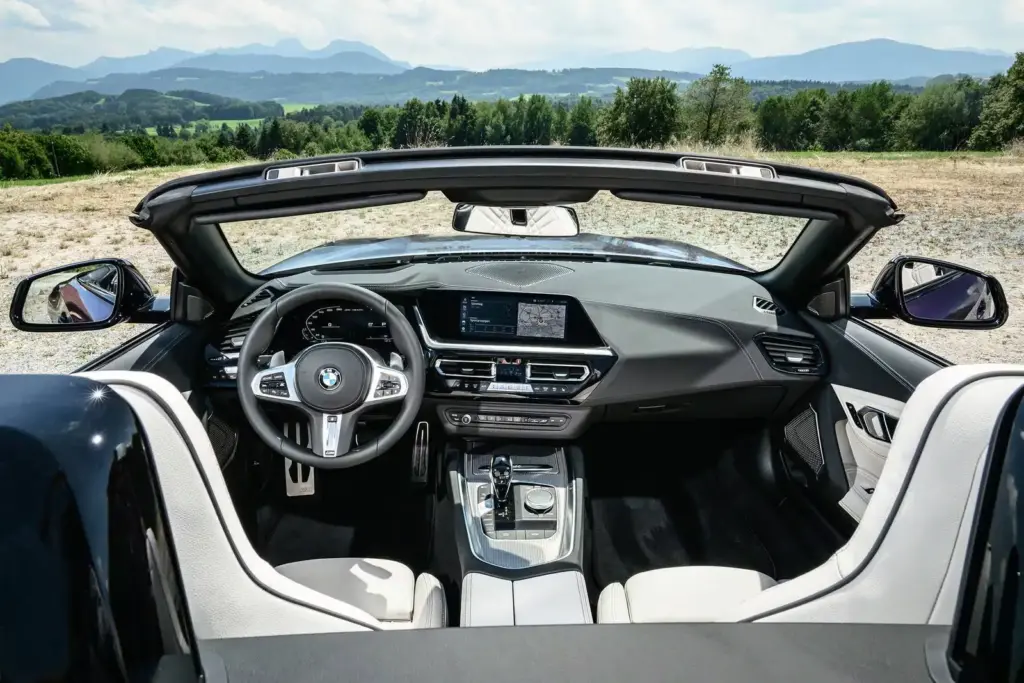
Handling and Driving Dynamics
Car and Driver sums up the Z4’s character perfectly: “When the road zigs, the Z4 is willing, but it lacks the locked-on feel of the 718 or the nervous aggression of the Supra”[2]. That’s not necessarily a weakness—it depends what you want.
The Z4 prioritizes refinement over raw feedback. Its handling strikes a balance between sportiness and comfort that makes commuting painless while still rewarding on back roads[2]. Skidpad testing shows 1.00-1.01 g of lateral grip, and 70-0 mph braking takes just 149-153 feet[2].
For pure track work, the Toyota GR Supra (which shares the Z4’s platform and engines) offers a stiffer setup in coupe form. Porsche’s 718 Boxster delivers more communicative steering. But neither matches the Z4’s top-down touring character with the same comfort level.
One YouTube reviewer noted the 2026 Z4 “is a fun sporty vehicle to drive” that works well as “a great daily driver and a great grand touring style vehicle that you could take on trips”[7]. That aligns with Car and Driver’s verdict that the Z4 shines as a “daily or long-distance cruiser”[2].
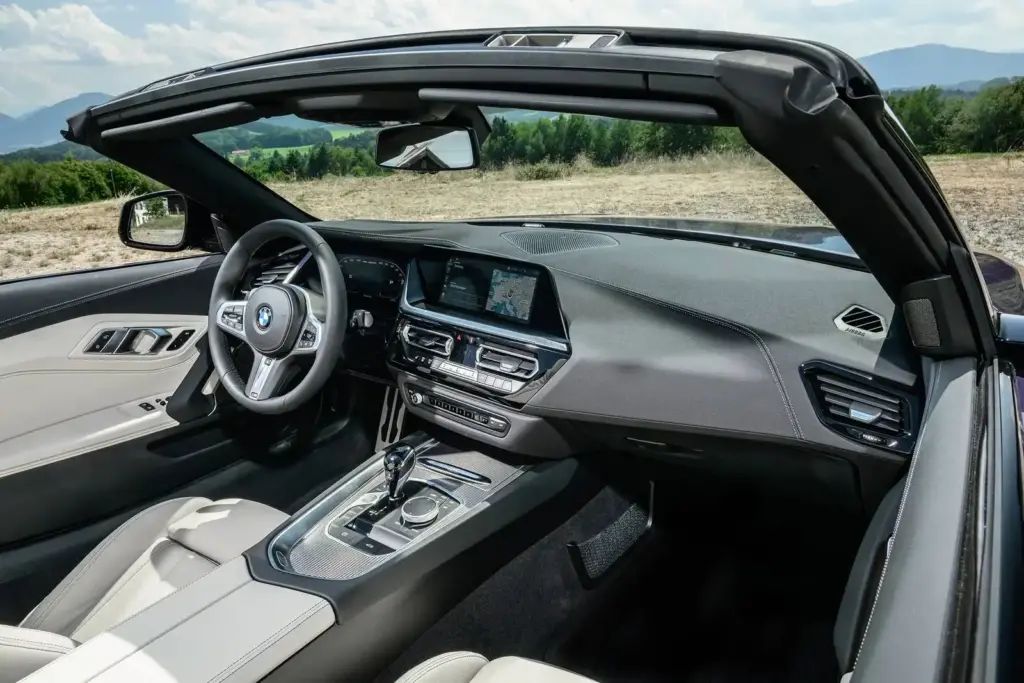
Fuel Economy
| Model | City | Highway | Combined |
|---|---|---|---|
| sDrive30i | 25 mpg[2] | 33 mpg[2] | 28 mpg |
| M40i (automatic) | 23 mpg[2] | 29 mpg[8] | 25-26 mpg |
| M40i (manual) | 19 mpg[2] | 26 mpg[2] | 22 mpg |
Real-world numbers can exceed EPA estimates. Car and Driver observed an impressive 37 mpg during sustained 75-mph highway cruising in the automatic M40i[2]. General driving yielded 19-24 mpg depending on enthusiasm[2].
The 13.7-gallon fuel tank[4] provides roughly 350-450 miles per fill depending on driving style. Premium fuel is required for both engines. And for those curious about what type of gas BMWs actually need—stick with 91 octane or higher.
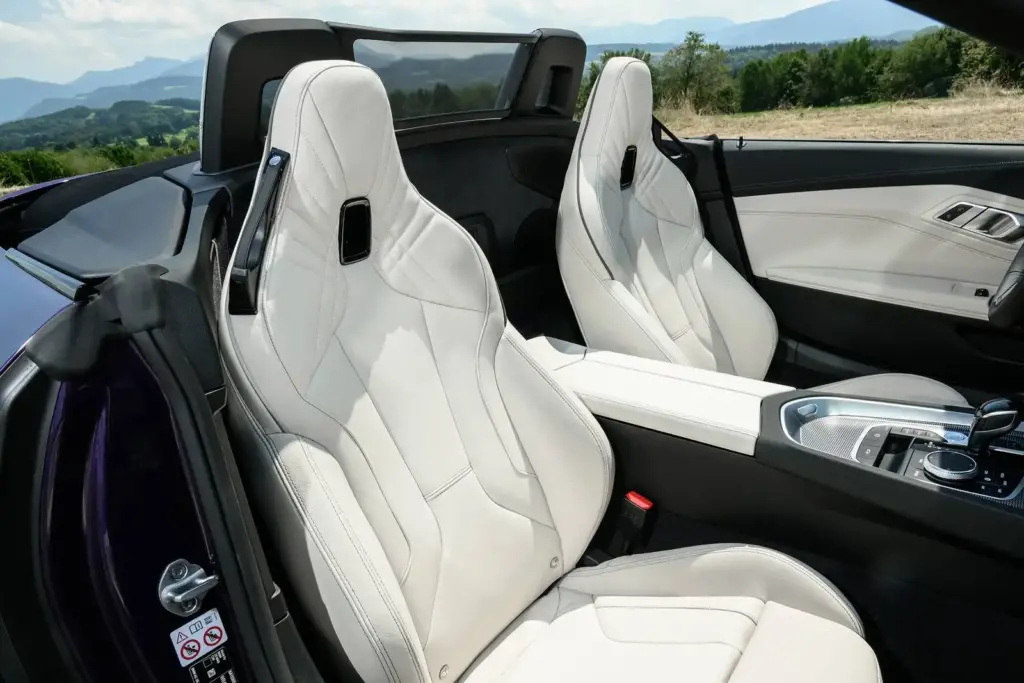
Interior and Cargo
Car and Driver declares the Z4 “may have the best interior in this class”[2]. Luxe materials, exceptional panel fitment, and excellent control placement create a cabin that feels properly premium. The seats are comfortable with sizable bolsters that hold you in place during spirited driving.
Surprisingly, there’s room inside even for taller drivers—six-footers fit without issue[2]. The well-insulated cloth roof seals tightly. With the top up, interior noise levels approach coupe-like quietness with minimal wind or road intrusion[2].
The soft top operates in seconds at the push of a button. A standard wind blocker minimizes buffeting at high speeds with the top down[2].
Cargo space measures 9.9-10 cubic feet[4]—enough for three carry-on suitcases according to Car and Driver[2]. That’s weekend-trip worthy for two adults. The interior also offers several storage bins, a center console compartment, a felt-lined cubby by the steering wheel, a netted shelf behind the seats, and two cupholders[2].
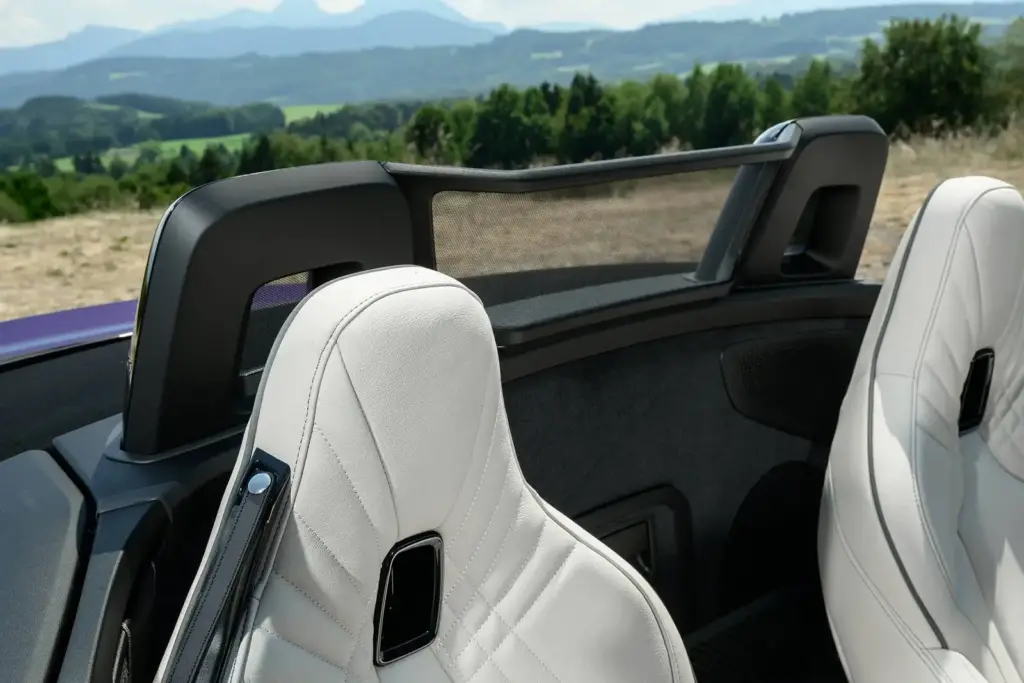
Technology and Infotainment
A 10.3-inch touchscreen comes standard with navigation, Apple CarPlay, and Android Auto[2]. Unlike some competitors that charge extra for CarPlay, BMW includes wireless connectivity as standard. The iDrive system features sharp graphics and intuitive operation via touchscreen, console-mounted knob, or voice commands[2].
Standard tech includes:
- 10.3-inch touchscreen with navigation
- Wireless Apple CarPlay and Android Auto
- Bluetooth streaming audio
- USB port
- Collision warning with pedestrian detection
- Lane departure warning
Available options include adaptive cruise control, blind-spot monitoring, rear cross-traffic alert, head-up display, and the Harman/Kardon surround sound system[2]. The Premium Package bundles parking assistant, head-up display, and ambient lighting for $1,250[2].
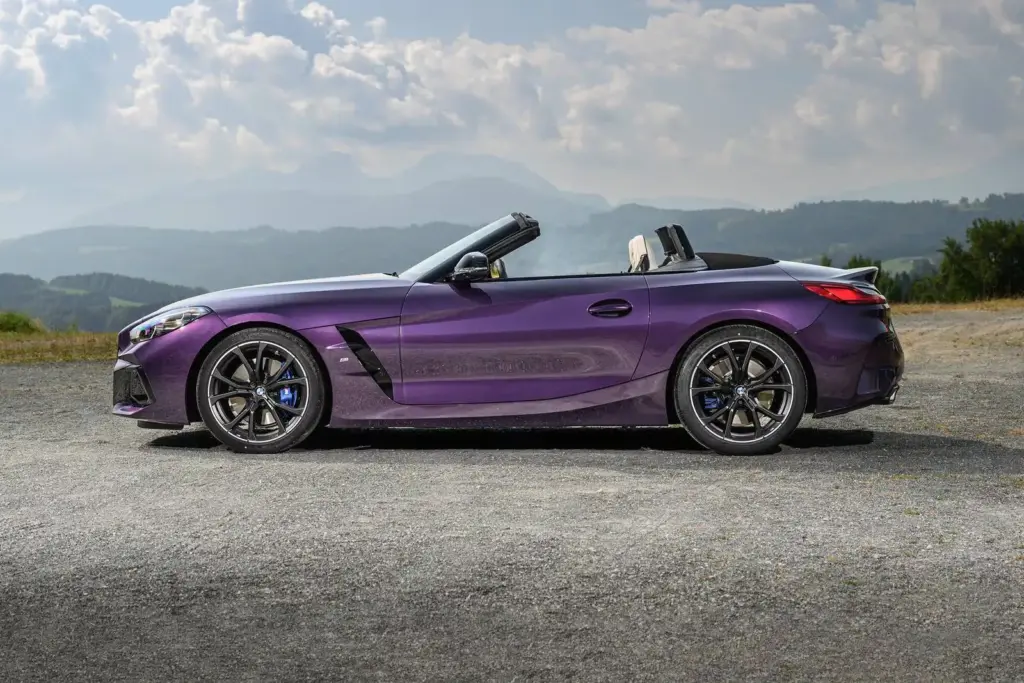
2026 BMW Z4 vs. Toyota GR Supra vs. Porsche 718 Boxster
| Specification | BMW Z4 M40i | Toyota GR Supra 3.0 | Porsche 718 Boxster |
|---|---|---|---|
| Starting MSRP | $68,400[1] | ~$59,495[2] | ~$79,595[9] |
| Horsepower | 382 hp[4] | 382 hp[9] | 300 hp[9] |
| 0-60 mph | 3.5 sec (auto)[2] | 3.9 sec (manual)[9] | 4.9 sec (manual)[9] |
| Body Style | Convertible | Coupe | Convertible |
| Manual Available | Yes (M40i only) | Yes | Yes |
| Top Speed | 155 mph[4] | 155 mph[9] | 170 mph[9] |
The Supra shares the Z4’s platform and turbocharged inline-six but comes only as a coupe with stiffer suspension tuning[9]. CarBuzz notes the Supra feels “more engaging” than the Z4[9], but you lose the open-air experience.
The base 718 Boxster uses a turbocharged flat-four that purists find disappointing compared to Porsche’s traditional flat-six[9]. CarBuzz’s verdict: “A Boxster with a turbocharged four-cylinder boxer engine is just wrong”[9]. The Z4 M40i gives you more power and straight-line speed for $11,000 less.
For BMW maintenance costs over time, expect similar expenses to the Supra since they share core components.
Reliability and Known Issues
The current-generation Z4 (G29, 2019-present) shows generally strong reliability. BreakerLink reports common Z4 issues historically include convertible top mechanism problems, brake line corrosion past 40,000 miles, and occasional engine misfires at idle[10].
A 2019 recall addressed steering track rod fracture risks on models built before August 2019[11]. Those cars should have received repairs years ago.
One Reddit user considering the 2025/2026 Z4 asked about reliability concerns given the model’s discontinuation. The general consensus: service shouldn’t be an issue since the engines and components are established BMW parts shared across multiple models[12]. Parts availability will remain strong for years.
BMW’s warranty covers four years or 50,000 miles for both limited and powertrain coverage[2]. The brand also includes three years or 36,000 miles of complimentary scheduled maintenance—a benefit neither Porsche nor Toyota matches[2].
Who Should Buy the 2026 BMW Z4?
Choose the Z4 if you:
- Want a comfortable, refined convertible for daily driving and weekend trips
- Value interior quality and top-down touring capability
- Prefer the smoothness of BMW’s inline-six over alternatives
- Want a manual transmission in a modern sports car (M40i only)
Consider alternatives if you:
- Prioritize track-focused handling (Toyota GR Supra)
- Need a coupe body style (Supra, BMW Z4’s platform cousin)
- Prefer naturally aspirated engines (save for a 718 Boxster GTS 4.0)
- Want maximum value (Nissan Z starts under $45,000)
The 2026 Z4 represents your last chance to buy BMW’s two-seat roadster new. The Final Edition adds collector appeal, but even standard models deliver that essential sports car experience—wind in your hair, responsive controls, and an engine that begs to be revved. For a grand touring convertible that works every day, it remains one of the best BMW sports cars available.
FAQs
How much is the 2026 BMW Z4?
How fast is the 2026 BMW Z4?
The sDrive30i reaches 60 mph in 5.1 seconds with 255 horsepower[2]. The M40i with automatic transmission hits 60 mph in just 3.5 seconds and completes the quarter-mile in 12.0 seconds at 116 mph[2]. With the manual transmission, the M40i reaches 60 mph in 3.9 seconds[2]. Both engines are governed to 155 mph[4].
Is the 2026 BMW Z4 being discontinued?
Does the 2026 BMW Z4 come with a manual transmission?
Yes, but only on the M40i trim. The six-speed manual is part of the Handschalter package, which adds stiffer anti-roll bars, retuned adaptive suspension, and larger staggered wheels with summer tires[2]. This package costs $3,500 on standard M40i models but comes standard on the $78,675 Final Edition[3]. The base sDrive30i is automatic-only.
How does the BMW Z4 compare to the Toyota Supra?
The Z4 and Supra share the same platform and engines but target different drivers[9]. The Supra comes only as a coupe with stiffer suspension tuning, making it more engaging on track but less comfortable daily. The Z4 offers convertible top-down driving and a more refined ride. The Supra starts about $9,000 less than the equivalent Z4 M40i[2]. Both will be discontinued after 2026.
References
- Cars.com. (2025). 2026 BMW Z4 sDrive30i specs & colors. https://www.cars.com/research/bmw-z4-2026/specs/
- Car and Driver. (2025). 2026 BMW Z4 Review, Pricing, and Specs. https://www.caranddriver.com/bmw/z4
- MotorTrend. (2025). 2026 BMW Z4 Final Edition: The 2-Seat Roadster Takes a Final Bow. https://www.motortrend.com/news/2026-bmw-z4-final-edition-first-look-review
- Kelley Blue Book. (2025). 2026 BMW Z4 Specs, Features & Options. https://www.kbb.com/bmw/z4/2026/specs/
- BMW of Lincoln. (2025). 2026 BMW Z4 Price, Specs, Features & Review. https://www.bmwoflincoln.com/bmw-reviews/2026-z4.htm
- TrueCar. (2025). 2026 BMW Z4 Review. https://www.truecar.com/overview/bmw/z4/
- Bros Four R Speed. (2025). Want the BEST Driving Experience? 2026 BMW Z4 sDrive30i Review [Video].
- Hilton Head BMW. (2025). BMW Z4 M40i EPA Fuel Economy. https://acceleride.hiltonheadbmw.com/BMW/Z4-M40i
- CarBuzz. (2024). Battle Of The Manuals: BMW Z4 M40i vs. Toyota GR Supra vs. Porsche 718 Boxster. https://carbuzz.com/features/battle-of-the-manuals-bmw-z4-m40i-vs-toyota-gr-supra-vs-porsche-718-boxster/
-
BreakerLink. (2025). How reliable is the BMW Z4, and what common problems do owners report?
How reliable is the BMW Z4, and what common problems do owners report?
- Jaxon Drives. (2024). BMW Z4 buyers guide review (2018-2025) Reliability and common problems [Video].
-
Reddit r/BMWZ4. (2024). Any concerns/thoughts on 2025 supposedly last year for Z4?
any concerns/thoughts on 2025 supposedly last year for Z4?
byu/papa2kohmoeaki inBMWZ4

I am a senior automotive analyst at Autvex. Expert vehicle evaluations, in-depth reviews, and objective analysis helping readers make informed automotive decisions with years of industry experience.

